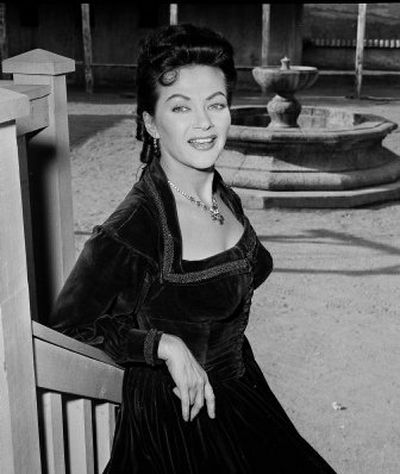Actress Yvonne De Carlo, of ‘Munsters’ fame, dies

HOLLYWOOD – Yvonne De Carlo, a sultry actress who played Moses’ wife in the 1956 epic “The Ten Commandments” but achieved wider fame as the vampirish wife and mother in “The Munsters” on television, has died. She was 84.
De Carlo died from complications of old age Monday at the Motion Picture and Television Country House and Hospital in the Woodland Hills section of Los Angeles, said her son, Bruce R. Morgan.
“She was one of the legendary glamour queens of the ‘40s and ‘50s,” said Kevin Burns, a film and television producer who was a longtime friend. “But she surprised everybody by becoming an accomplished actress.”
On “The Munsters” she was still allowed to be sirenlike as Lily, the wife of the bumbling Herman Munster, played by Fred Gwynne, in the horror-spoof that originally aired from 1964 to 1966 on CBS.
Gwynne and fellow cast member Al Lewis, who played Grandpa Munster, were accomplished stage actors who were initially “appalled that Yvonne, who they thought of as a beauty queen” could carry her weight in the series, said Burns, who made a documentary for A&E on De Carlo.
Even though the part was “a comedown for her, she loved the makeup and the role” that allowed her to preside over the monstrous-looking but sweet and relatively normal clan, Burns said.
Midway through the run of “The Munsters,” De Carlo took delivery on a Jaguar that she had custom-fitted with coffin rails on top, spider web hubcaps and a Dracula crest on the side.
By the time De Carlo became a Munster, she had already been cast in about 100 feature films, many of them “sword and sandal” movies that exploited her looks and figure in harem dress. She also often appeared in Westerns.
Her breakthrough came in the title role in “Salome, Where She Danced,” a 1945 film about an exotic dancer trying to become a Mata Hari-type spy. Critics savaged the film, but the box-office hit made her a star, according to “Leonard Maltin’s Classic Movie Guide.”
After Cecil B. DeMille saw her portraying “a saintly type of woman” in “Sombrero,” a 1953 musical melodrama, he was “very much impressed,” De Carlo told the Times in 1956.
He “promptly said, ‘You’re it,’ ” and cast her as Moses’ wife, Sephora, allowing her to break away from the screen-siren roles.